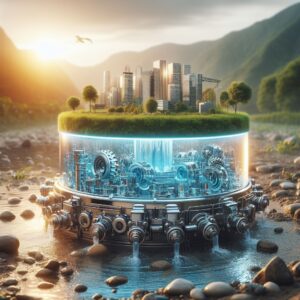.Clean water technology stands as a beacon of hope in the face of global water scarcity and pollution challenges. This innovative field focuses on developing advanced solutions to ensure access to safe and potable water for communities worldwide. By leveraging cutting-edge technologies and innovative approaches, clean water tech addresses both scarcity issues and the purification of contaminated water sources, offering sustainable and efficient methods to secure this vital resource.

Addressing Water Scarcity
Water scarcity remains a pressing global concern, affecting millions of people worldwide. Clean water technologies tackle this challenge through various means, including desalination, rainwater harvesting, and wastewater recycling. Desalination processes, such as reverse osmosis and distillation, extract salt and impurities from seawater, providing a viable freshwater source for regions facing acute water shortages. Additionally, rainwater harvesting and wastewater recycling systems conserve and reuse water, reducing strain on freshwater sources and mitigating scarcity.
Purification Innovations
Ensuring access to safe drinking water involves combating waterborne contaminants. Clean water technologies employ innovative purification methods, such as advanced filtration systems, UV treatment, and nanotechnology-based solutions, to remove pollutants, pathogens, and chemicals from water sources. Advanced filtration systems, including membrane technologies and activated carbon filters, effectively eliminate impurities. Similarly, UV treatment and nanotechnology-based approaches offer efficient disinfection and removal of microbial contaminants, providing safer water for consumption.
Challenges and Sustainability
While clean water technologies present promising solutions, challenges exist in their widespread implementation. Affordability, energy consumption, and scalability of these technologies pose hurdles, particularly in resource-constrained regions. Additionally, ensuring the sustainability and long-term maintenance of clean water solutions require concerted efforts, community involvement, and policy support to overcome these challenges.
Future Prospects and Impact
The future of clean water technology holds immense promise. Continuous research and technological advancements aim to enhance the efficiency, affordability, and accessibility of clean water solutions. As innovations evolve, decentralized and community-centered approaches to water purification and scarcity management are emerging. These innovations not only contribute to addressing immediate water challenges but also play a pivotal role in achieving Sustainable Development Goal
Clean water technology stands as a beacon of hope in addressing the global challenges of water scarcity and contamination. Across the globe, millions lack access to safe drinking water, facing health risks due to contaminated sources or insufficient supplies. However, innovative solutions within clean water technology offer promising avenues to combat these issues. These solutions span a spectrum of approaches, from purification techniques to novel methods for sourcing and conserving water.
One of the primary facets of clean water technology involves purification innovations. Advanced filtration systems, including membrane filtration and activated carbon filtering, effectively remove impurities, chemicals, and contaminants from water sources. Additionally, cutting-edge technologies such as UV treatment and nanotechnology-based solutions offer efficient means of disinfection, eliminating microbial threats and ensuring the safety of drinking water.

Moreover, combating water scarcity remains a pivotal focus of clean water technology. Desalination processes, such as reverse osmosis and distillation, offer viable solutions by converting seawater into freshwater. Rainwater harvesting and wastewater recycling systems also play a crucial role in alleviating scarcity by conserving and reusing water. These sustainable approaches not only help mitigate water shortages.
Despite the promising solutions, challenges persist in implementing clean water technologies universally. Affordability, energy consumption, and the scalability of these technologies pose hurdles, especially in economically disadvantaged regions. Ensuring the sustainability and accessibility of these innovations require collaborative efforts, technological advancements, and policy support to make them more affordable and adaptable to diverse communities.
Conclusion:
Clean water technology serves as a beacon of hope in the pursuit of universal access to safe and potable water. By leveraging innovative methods to tackle water scarcity and purification challenges, this field plays a pivotal role in safeguarding this precious resource. With ongoing advancements and a collective commitment to sustainability, clean water technology stands poised to make substantial strides in ensuring a healthier, more sustainable future with equitable access to clean water for all innovations addressing water scarcity and purification Clean Water Tech.
For more Article like this, visit our Website Here
